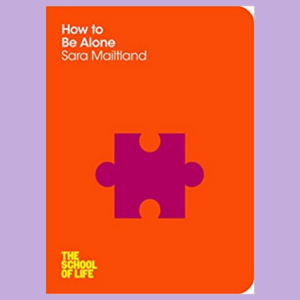How To Be Alone – Sara Maitland
There is a problem, a serious cultural problem about solitude. Being alone in our present society raises an important question about identity and well-being. In the first place, and rather urgently, the question needs to be asked. And then-possibly, tentatively, over a longer period of time-we need to try and answer it.
Although being alone is an essential and unavoidable part of being human, whether by choice or by circumstance, today’s emphasis on extroversion and human connection leaves many living a solitary life in a position of feeling “sad, mad or bad”.
In this installment from The School of Life’s attempt at a more rigorous form of self help book, Sara Maitland explores how we got here and how to reclaim aloneness as a space where we can thrive. She states:
Solitude can happen to anyone: we are all at risk. There is no number of friends on Facebook, contacts, connections or financial provision that can guarantee to protect us. The largest, and fastest growing, groups of people living alone are women over 75 (bereavement creates solitude) and men between 25 and 45 (the breakdown of intimate relationships creates solitude). More often, solitude catches us on the hop, as it were, and few of us can feel we will be securely and indefinitely supported by family, neighbourhood, community or even friendship. It is not sustainable to live in defensive postures of fear and avoidance all the time.
She goes on to argue that instead of living in defensive fear of solitude, we can actively change our relationship to it. Sara herself has chosen to live alone for over 20 years in a remote part of Scotland where she can often go an entire day without seeing anyone.
I got fascinated by silence by what happens to the human spirit; to identity to personality when the talking stops, when you press the off-button, when you venture out into that enormous emptiness. I was interested in silence as a lost cultural phenomenon, as a thing of beauty and as a space that had been explored and used over and over again by different individuals, for different reasons and with wildly differing results. I began to use my own life as a sort of laboratory to test some ideas and to find out what it felt like. Almost to my surprise, I found I loved silence, I found I loved silence. It suited me. I got greedy for more. In my hunt for more silence, I found this valley and built a house here, on the ruins of an old shepherd’s cottage.
Interestingly from my own experience as an English speaking therapist, some of the most telling and communicative moments happen when silence is allowed into the room, as if the bonds of human communication can recede into the background for a moment so that the patient has the freedom to see what is really within her, rather than be dictated by the cloud of social necessities. Donald Winnicott, that great British psychoanalyst, observed this in his work with children and came to believe that a real capacity to be alone and enjoy solitude in adult life was essential to well being. He observed that this capacity originated in childhood when a child was free to be alone in the presence of his mother. In that moment all of her basic needs have been satisfied and she is free just to be.
Moving abroad can bring up serious feelings of loneliness, especially when one has uprooted from a place of family and familiarity. It brings to my mind my own practice for therapy in Berlin. How many of those uprooted could find depth and comfort in cultivating their aloneness? To be helped to see before them an opportunity of self discovery and not just a sentence filled with stigma?
Some of her suggestions for reclaiming solitude include:
- Face your fear
- Do something enjoyable alone
- Explore Reverie
- Look at nature
- Learn something by heart
- Solo adventure
- Train the children
- Respect difference
I climbed up the steep sided corrie. It was sheltered there and magnificent – almost vertical mountains on both sides- a mixture of shining rock and loose scree, and below, tiny stands of water that looked like handfuls of shiny coins tossed casually down. It was so huge. And so wild and so empty and so free…And then quite suddenly and unexpectantly, I slipped a gear or something like that. There was not me and the landscape, but a kind of oneness:a connection as though my skin had been blown off. More than that-as though the molecules and atoms I am made of reunited themselves with the molecules and atoms that the rest of the world is made of. I felt absolutely connected to everything. It was very brief but it was a total moment.


